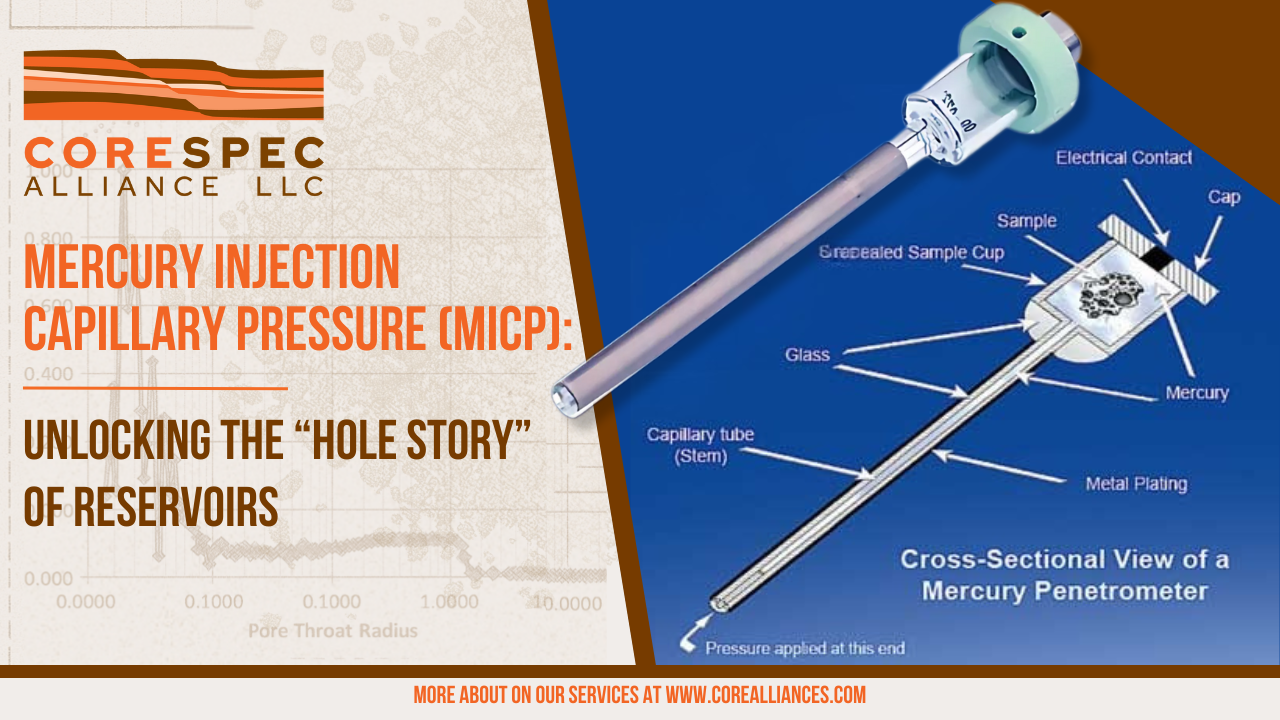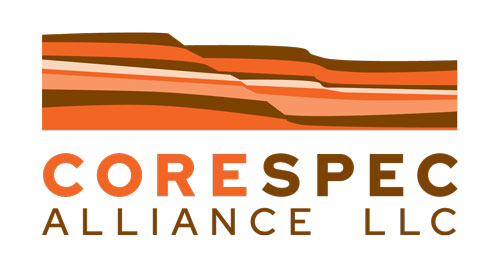
08 Sep Mercury Injection Capillary Pressure (MICP): Unlocking the “Hole Story” of Reservoirs
Mercury Injection Capillary Pressure (MICP): Unlocking the “Hole Story” of Reservoirs
In subsurface evaluation, the story isn’t just about the rock itself — it’s about the holes within it. Mercury Injection Capillary Pressure (MICP) analysis tells this “hole story” by measuring the size of pores in rock samples and how they are connected. For reservoir engineers, Petrophysicists, and geoscientists, this data is critical to understanding reservoir quality, fluid flow, and ultimate hydrocarbon recovery.
What Is MICP?
MICP is a laboratory technique that measures pore throat size distribution and connectivity by injecting a non-wetting liquid — mercury — into rock samples at increasing pressures. Using the Washburn equation, pressure is converted into pore throat diameter, producing a pore size distribution curve that reveals how fluids move through the rock.
This allows CoreSpec to quantify key reservoir characteristics such as:
- Pore throat size distribution – Differentiating between reservoir-quality and non-reservoir rock.
- Porosity and permeability relationships – Explaining why samples with similar porosity can behave very differently in terms of flow capacity.
- Capillary pressure behavior – Establishing hydrocarbon–water saturation profiles and fluid column heights.
- Leverett J-functions – Providing a normalized framework for understanding capillary pressure curves across rock types.
Why It Matters
In both conventional and unconventional plays, MICP provides insights that standard core or log measurements alone cannot. Consider the following examples from CoreSpec’s MICP datasets:
- Tight gas sands: MICP plots reveal pore throat radii versus cumulative porosity, identifying cutoffs that separate reservoir from non-reservoir intervals.
- Conventional sandstones: Fine distinctions between main channel, proximal splay, distal splay, and lower shoreface facies can be mapped through pore connectivity and permeability differences.
- Carbonates: Complex pore systems, including interparticle, intraparticle, vuggy, and dissolution porosity, can be quantified to better predict flow performance.
By connecting these measurements to log-derived porosity, CoreSpec ensures that laboratory results scale directly to field applications. In fact, average porosity values from cuttings and cores are typically within one porosity unit of log data — a critical validation for operators.
CoreSpec’s Approach
CoreSpec’s MICP service is designed to deliver actionable reservoir insights. Beyond traditional laboratory outputs, CoreSpec integrates MICP with other advanced core analyses to provide a comprehensive picture of reservoir quality. Deliverables include:
- Capillary pressure curves and saturation profiles.
- Reservoir cutoff determinations.
- Pore throat distributions and pore volume fractionation.
- Integration with GRI (Gas Research Institute) method data for unconventional resource plays.
- Conformance, compressibility, and intrusion evaluations of mercury injection pathways.
Applications Across Energy Sectors
While MICP has long been a cornerstone of oil and gas reservoir characterization, its applications are expanding across the broader energy transition. The same pore-scale insights apply to:
- Carbon Capture, Utilization, and Storage (CCUS): Determining CO₂ injectivity and storage security.
- Hydrogen Storage: Assessing pore throat suitability for hydrogen containment.
- Geothermal Systems: Evaluating flow capacity and connectivity for sustainable heat extraction.
By telling the “hole story,” CoreSpec helps operators and energy innovators unlock a deeper understanding of the subsurface, ensuring more reliable, efficient, and future-ready development.
Let’s Talk Reservoirs
Whether you are working in unconventional shales, conventional sandstones, or complex carbonates, CoreSpec’s MICP services provide the clarity needed to make confident decisions.
_____________________________________
Media Contact:
Emile Stretcher
Marketing Director, Infinity Marketing (on behalf of CoreSpec)
emile@infinitymkting.com
(337) 502-2161


No Comments